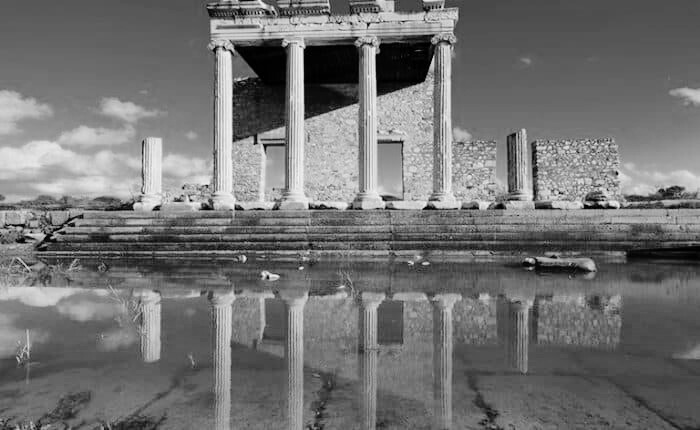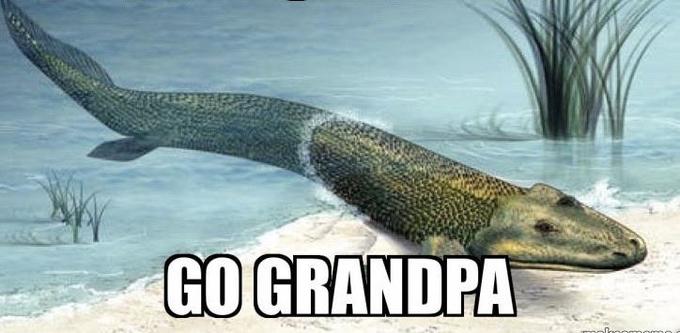"Of the first philosophers, most thought the principles which were of the nature of matter were the only principles of all things. Thales, the founder of this type of philosophy, says the principle is water."
- Aristotle, Metaphysics
The semi-mythic figure of Thales enjoys the honorific and burden of being the first "of the first philosophers" in the Western Platonic-Aristotelian tradition. He was reportedly born in 620 BCE within the city of Miletus -- what is now modern Turkey. It's speculative as to whether or not Thales even wrote anything, and an investigation into this speculation would be another effort in-and-of itself. Yet, the consequence and legacy of his thought and philosophical method are unquestionable and canonized in the Milesian school of natural philosophy, which radically broke with mythic and divine pre-scientific conceptions of being and the universe and incubated the practice of examining the universe through an arche, or foundational principle. For Thales and his pupils (notably Anaximander), this principle, as explained by Aristotle, was matter, and the legacy and magnitude of this belief is evidenced by several more honorifics which Thales boasts, one notably being the father of science itself. Here lies a distinctive point as to the standing (perhaps supremacy? or paternity?) of the philosophical method in regards to the scientific. But back to Thales, and back to water.

Thales was surrounded by water. His conviction that water made up the foundation of reality was inextricably linked to the material surroundings into which he was born. The City of Miletus was located in the region of Ionia, occupied in pre-Socratic times by historic Greek peoples whose livelihoods of irrigation farming and shipbuilding were inextricably linked to the proximity of the Aegean Sea, the Maeander River, and a showery climate. Moreso, the geographic dynamism of the land surrounding and encompassing Miletus would have exposed a young Thales and the Milesian people to uniquely transformative properties of water, such as its capacity to flood (engulf land) or recede (expose land). For years before and during his lifetime, the island of Lade, upon which Miletus was built, expanded in size as the watery substance of the Maeander River crashed into its banks. This interaction -- of water producing mud producing earth -- revealed a generative property of water from which Thales deduced his principle. The historical recession of this gulf and the modern positioning of the ruins of Miletus some 10 km inland remain a testament to Thales' radical ideas.
The maritime economy of the Aegean world at this time further produced in Thales the conviction of water as the foundational principle of reality. Within this interconnected market of Greek poli, the port of Miletus would have been an anchor-point for ships from all over the ancient Mediterranean world, carrying with them (most deductively) food and supplies. Furthermore, Milesian farmers and craftsmen relied upon the operators of these ships to exchange currency with them for their productions, and as such the spawning and disappearance of these ships upon the watery horizon constituted the material means of the preservation and perpetuation of life for Thales and the Milesians. Miletus was obviously not unique at all in this regard, yet the city produced within its ranks the first Western human mind who transposed these phenomena into intelligible language, expanded the possibility and capacity of the human being to conceptualize himself within the world. Thales' greatest contribution lies in this proposition of an alternative to the hegemonic Greek cosmology of the world. This was a world born out of chaos (kháos), the primordial void-abyss which produced (somehow?) the Titans and Olympians to enact all worldly phenomena (war, peace, love, growth, decay) upon creation. Thales and his arche of materiality grounded the Greeks in a conviction of their material existence as self-referential, catalyzing a Greco-Roman tradition of humanity which no longer lived in superstition of the Earth but sought to reclaim and reshape it in its own image.
The legacy of the Milesian arche (first principle) cannot be denied in its continued centrality to the major milestones of Western thought, from Heraclitus' fire and flux, to Plato's transcendental Forms, to Descartes' res cogitans and res extensa, to Kant's Ding an sich (Thing-in-Itself), and even to modern physics' search for the fundamental building blocks of reality. To those who may in the end still scoff at the significance of water is the principle, Nietzsche rebukes you in "The Tragic Age of the Greeks":
"Greek philosophy seems to begin with an absurd notion, with the proposition that water is the primal origin and the womb of all things. Is it really necessary for us to take serious notice of this proposition? It is, and for three reasons. First, because it tells something about the primal origin of all things; second, because it does so in language devoid of image or fable, and finally, because contained in it, if only embryonically, is the thought. 'all things are one.'"

There exist a plethora of other contributions ascribed to Thales in the Greek historical-scientific-philosophical tradition, such as his claim for the spherical quality of the Earth and his feat of predicting a solar eclipse. Yet his water principle (and his Milesian school pupils' continued fixation on the nature of materiality) remains his most notable, most celebrated, and most influential achievement. Bruce Lee was a Milesian too, it seems, as are all the young people with "Be Like Water" tattoos. The charm and perceptive brilliance of Thales and the Milesian school owes to the reductive essentiality of its axiomatic upon materiality, as opposed to the supposition and myth found in Hesiod and in Greek mythic cosmology. Even in a modern context, Thales is correct. The principle is water. Abiogenesis, primordial soup, that meme of the first creature that came onto land and represents the link between bony-vertebrae fish and you now in your office job -- water is the essence of self-replicating matter and reproductive life, and Thales (as a descendant of Tiktaalik the bony fish) was uniquely capable of processing and examining this truth in the context of material reality and of himself as a human being.
← BACK TO HOME